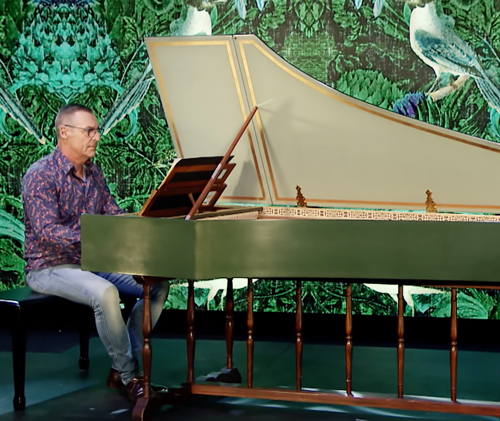Bach Series
Paul Dyer Harpsichord
BACH Nº 13
Paul Dyer performs the Allemande from JS Bach's French Suite No. 4 in E-flat major, BWV 815

PROGRAM NOTES
Johann Sebastian Bach (1685-1750)
FRENCH SUITE NO. 4 IN E-FLAT MAJOR, BWV 815
Allemande
In the nineteenth century, only a small number of music lovers, mostly in Germany, knew anything of JS Bach and his musical works. The 1829 performance of St Matthew Passion in Berlin, organised and directed by Felix Mendelssohn, began the slow Bach revival.
Throughout Bach’s life his reputation as an extraordinary keyboard player dominated any renown as a composer and teacher. After many decades of intense research and study of his music, Bach is now considered one of the most genius composers of all time, if not the greatest. It would be interesting to know if certain opinions held by Bach’s contemporaries and other influential people, such as Frederick the Great, may have differed in this light.
Even before the last years of his life, JS Bach was regarded as an outdated musician. On his visit to Frederick’s court in Potsdam in 1747 he was referred to as the 'Old Bach', with old meaning both elderly, and severely out of fashion. Nevertheless, his keyboard works, and The Well-Tempered Clavier in particular, survived him and were closely studied and highly regarded by composers like Haydn, Mozart, Beethoven, Chopin and many more.
Bach’s collection of French Suites was composed between 1722 and 1725. The title was given posthumously by a publisher, a decision most likely based on the style in which the pieces are written. After all, it is a large collection mostly of stylised French dances composed in French manner.
As a 15-year old Bach travelled on foot with a friend to Lüneburg, where he had been accepted as a scholarship student at St Michael’s school. From there he would regularly journey to Hamburg and other places to attend recitals and other musical events.
The Duke of Celle-Lüneburg was an avid Francophile and married to Eléonore d’Olbreuse, a Huguenot of noble birth. He maintained an orchestra consisting largely of Frenchmen and his court would regularly sojourn in Lüneburg, where performances were held of music in styles popularised by the court of Louis XIV in Versailles. Hearing the elaborate ceremonial music of composers such as Lully and Charpentier would have been an impressive experience as it was not well-known in Germany at that time. We know that JS Bach participated in these musical events, and here he would also have been exposed to Louis Couperin’s keyboard music, an excellent source from which to learn the French dance rhythms explored throughout this collection.
WHAT TO LISTEN FOR
The opening movement of each suite in this set is an Allemande, a very old dance originating from Germany that became fashionable both in France and England. According to Bach’s contemporary Johann Mattheson, in Der Vollkommene Capellmeister (Hamburg, 1739), the Allemande is “…serious and well-composed harmoniousness in arpeggiated style, expressing satisfaction or amusement, and delighting in order and calm”.
Program Notes: Joanna Butler & Hugh Ronzani, 2020
BACH SERIES PRESENTING PARTNER
Artists
Listen
{% error.message %}
More for you...
{% series.name %}
Featured Content
{% series.featuredTitle %}















